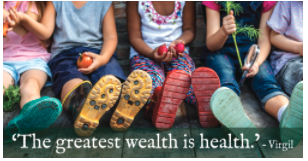Healthy Mendocino statistics show that the chronic diseases of stroke, heart disease, and high blood pressure are higher in Mendocino County than in any other part of California. Childhood Obesity is a serious problem nationwide and is one of the top health priorities for the Healthy Mendocino Project. There is solid scientific research which proves that poor diet choices are linked to these chronic conditions.
As a nation, we are facing significant health problems. The U.S. is ranked 9th in life expectancy among nations in the developed world. The U.S. work force is plagued with absenteeism and reduced productivity because of chronic health problems, including depression. 78% of healthcare expenditures are for treatment of chronic disease. Indeed, re-connecting food and health can shift the drastic results of our poor food choices.
Research shows that the food we eat is directly linked to our health and that certain foods adversely affect our health. With basic cooking and nutritional knowledge taking a back seat to processed/fast foods, children “learn” to become dependent on, or acquire a taste for, these processed foods, resulting in obesity, malnutrition and chronic disease.
From a behavioral point of view, it is noted that eating disorders are on the rise and family dinners are on the decline. These behaviors point to a “disconnect” between food and health. Becoming conscious of how we feel after we eat is a start in re-connecting. How do we feel after we eat one or more doughnuts? How does an apple or orange make us feel? Are we eating from an emotional need or actual physiological hunger? Are we hungry or bored? Many of us have lost that connection between true hunger and healthy food choices and portions.
Once again, research indicates that families are no longer eating dinner together even though family meals provide the perfect opportunity to connect with each other. Eating dinners together is also a good time to talk about food and its importance to our health. Family dinners can become a ritual that allows the time to increase our appreciation and enjoyment of food . . . an opportunity that can be utilized to teach us that good food choices equate to a healthier life.
How do we connect food and health? Part of the solution may be to prioritize food education in schools. Make it as important as the 3r’s. Empower primary school teachers to integrate gardening and cooking into their school curriculum. By teaching children about food, where it comes from, how to grow it, harvest it, cook it, and how it can benefit their health, we equip them with the knowledge and confidence to make healthy choices.
The Frank R. Howard Foundation is developing the “Food Literacy Project: Restoring the Connection between Food and Health.” The Food Literacy Project will highlight “food as medicine” or “you are what you eat”, emphasizing the essential connection between our diet and our health. It is a three-tiered program that will teach gardening, nutrition, and cooking. The “Food Literacy Project” will cover two of the five targeted “areas of priority” defined by the Healthy Mendocino Project. It addresses the priorities of Childhood Obesity/Family Wellness and Poverty.
The “Food Literacy Project” will be a seasonal program, coordinated with seasonal produce available from the Foundation’s Commonwealth Garden. During March-July, the program will focus on a variety of gardening skills which will include harvesting the produce for the cooking/nutrition classes which will start in May and run through October. The “Food Literacy Project” will also include the opportunity for families to volunteer in the garden in exchange for a weekly stipend of fresh, organic produce . . . produce they helped grow, harvest and prepare.
Part of the “Food Literacy Project” will include the group meal, with children sitting down together to enjoy and talk about the food they prepared. This is also an opportunity to talk about conscious eating and not eating beyond our comfort level.
To re-connect with the food we eat in a healthy and conscious way is a multi-faceted process. Start small, doing only what you can instead of trying to do everything at once. Even if you know what you should do, just pick one thing to change and focus on that. It takes effort and planning, but the outcome is a healthier and happier you.
###
Suzanne Picetti-Johnson, M.S. is the Director of Avenues to Wellness, a community based wellness program of the Frank R. Howard Foundation. Her background is in Marriage Family therapy where she specialized with children and families in conflict. She also practiced massage therapy for many years which included working with body image and eating disorders.

